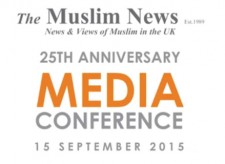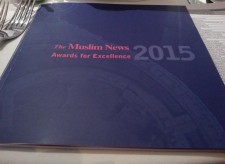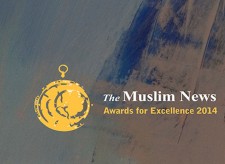Former army chief, Lord David Richards tells Editor of The Muslim News, Ahmed J Versi that UK may be involved in wars in the future (Photo: Sara Asaria/Muslim News)
Former Chief of General Staff is damning of the British Government’s policy in Iraq and Syria, saying that it helped to sustain civil wars by unleashing forces it did not understand nor were easy to control and warns of similar risks in Afghanistan after Nato troops leave.
Lord David Richards fears that despite Britain’s involvement in a whole series of military débâcles overwhelmingly in Muslim countries, the country’s armed forces will be drawn into war again within the next decade or so even though there has been a distinct reluctance to put boots on the ground any more.
In a wide-ranging exclusive interview with The Muslim News Editor, Ahmed J Versi, as Britain is commemorating the centennial of the First World War, Richards also warned that political ambitions and military means must be “synchronised” and lessons must be learnt from the past 15 years
His concerns comes as floodgates have been opened for the rise of the ISIS to capture swaths of land in both Syria and Iraq and he confirmed that he drew up plans to build 100,000-strong Syrian rebel army but which were only to be rejected by Prime Minister, David Cameron.
The 2003 invasion of Iraq, Richards said, “liberated forces that we’re still seeing playing out today, all these years later, 9 years later. Iraq was ruled by, yes, a brutal dictator, but he contained all these forces and he contained as a semi secular leader, Iranian ambitions in the region.”
“So, it’s that, it’s what happened immediately after the war, the initial stages of the war, has liberated lots of forces that we don’t understand properly and certainly can’t control easily.”
The recently selected crossbench peer was head of Britain’s Armed Forces between 2010 and 2013. He did not go as far as saying that the invasion of Iraq was responsible for the rise of the ISIS but admitted a “number of errors” were made in the war.
“Many were recognisable that people couldn’t or wouldn’t do something about. The first was the way we tried to implement the peace in Iraq in the years after 2003.”
As far as the more recent events in Syria were concerned, he explained that the contingency plans he was asked to draw up were to “provide, much more active support to the opposition groups, the good opposition groups that were fighting the Assad regime.”
“That option was not taken forward by the Government here, or in America. So, you know, I think we could have nipped it in the bud probably then, but it was a huge bill and I understood why governments were reluctant to do it. They hoped it wouldn’t come any further.”
“We did provide an option to the Prime Minister and the Cabinet here, that, apparently, which I didn’t know about, was discussed with the Americans. And it was to do it properly, if you like: what we did was enough to allow the opposition groups to maintain an effort, but it was never enough to let them win.”
When pressed about the plan, Richards declined to go into detail what was involved or if special forces would have been used but said it was “the full works, this was to ensure that within about a year, they would be capable of taking on, by then, a demoralized, Syrian, Assad, regime.”
He admitted that there were “definitely risks” about his plan, including that it could actually inflame the region because Iran for one would not allow the overthrow of the Syrian regime. But he was fairly dismissive, saying that “you can’t have it both ways.”
His concern was that what was agreed by the west and some Arab countries was just to “keep the war alive but not enough to let the good guys win.” He said “through frustration, ISIS has grown up and now it’s spread to Iraq. Sometimes you have to act decisively, quickly and this was, as I argued, part of a contingency plan, would be an option that, perhaps, would avoid this situation.”
The former army chief agreed that Arab countries needed to come together but feared that it was much harder now because they didn’t at the start of protests in Syria in 2011.“It is not helpful that the Arab world itself is divided. But this plan had, amongst other virtues, that they would have had to come together to back it, or there would have been no Western help. And that is something that they were very keen to have. So maybe that would have cohered them.”
With regard to the future, he wasn’t sure. But with the ISIS taking over land in Iraq, he said that there was a “big risk” of the country being divided. “I know very well respected academics who say that would be the best outcome.”
His warning though, was that dividing the three regions of Kurds, Sunnis and Shias, where much of the oil wealth is, make it very unstable. “Maybe it will be slightly less unstable than the chaotic, no-boundaries fighting everywhere that we’ve got today.”
Richards believed that Britain did not have a clear strategy with regard to the rise of the ISIS. The US, he wasn’t sure but he had not seen one. “I know what they want to happen, which is for there to be peace and for ISIS to be squeezed back into irrelevance. I think this is a much bigger challenge than it was two years ago and I think will require very big responses and I’m worried at the moment that we don’t understand the scale of the problem.”
“What we have got to decide is what outcome do we seek, we call it the end, ends, and then you look at the ways and means to do it. And I don’t know, right as I sit here, what those ways and means to do it are.”One suggestion could be, Britain as part of a wider, international, Arab, probably American-led effort should play a role.
He did not rule out what was happening in Iraq and Syria could spill over in Afghanistan when troops are withdrawn. “There’s no reason why it should, but if the West does not learn the lessons out of our inability or reluctance or (Iraq Prime Minister) Maliki’s reluctance to allow us to continue to support them, Iraq, after 2011, there is a big risk.”
“I feel that we need to make it quite clear now to the Afghans and others in the region that the West understands its responsibilities towards Afghanistan and the 8 million who decisively rejected the Taliban by the act of voting, by the way, the other day, that we will be with them, and we will not do what we did in Iraq. I should say, also, quickly, that the vast majority of Afghans and their leaders, both Ashraf Ghani and Abdul Abdullah want us to stay. We’re not talking about boots back on the ground, we’re simply saying we should do what we’ve already promised to do, which is really important.”
He did not say if Afghanistan, like Iraq, would be left without an air force that was paid for. “There are certain things that they have yet to fully master. Creating an army, given that we took too long to do it, you know when I was Commander back in 2006/7, we knew, and even in my orders, the main effort was helping the Afghan armed forces develop.”
Richards was convinced that Britain’s reluctance to involve troops in overseas war was not going to last. “If you think that we will never have boots on the ground ever again anywhere, forget it, History is not being rewritten. Yes, at the moment, the balance is against doing that and rightly so. There’s no need right now, that I can see, for British infantry say, to go into a country in any numbers to fight as we have done.
“I’m careful not, I don’t usually use the term proxy, but there, we can use those very highly skilled soldiers to help train our allies or friends in countries like Syria, that need to do the fighting, because someone’s going to have to do the fighting. So I think there’ll be a lot of support and training and the British army, with its reputation as high as it is in great demand for that.”
“In respect to Syria, there were no British or allied boots on the ground, but there was a role for armed maritime and air forces in support of the opposition groups if they got to the point that they could be used. So I think the navy and air force will continue to safeguard us and we will have to continue to help our friends in some delicate situations.”
Asked if the future role of the armed forces would be mainly peacekeeping and helping other countries to stabilize themselves, he said it would be nice but he did not believe history has been rewritten. “I have a horrible feeling that at some point, in the next 5, 10, 15 years, the British armed forces, either because of our country’s vital national interests are threatened, or because it is morally right to do something, say look if there’s another Rwanda, I would be horrified if we stood by and let something like that happen when we could do something about it. So, you know, we will be involved in a war again. How? Let us see as history plays out.”
The former Chief of General Staff said that “nothing would please me more” than to see Iran be respected as a great nation. “I hope that what’s happening with ISIS, what’s happening in Iraq and Syria, where these really very extreme people are in the ascendant, that that might bring mainstream Sunni and Shia together around a common cause which is to stop this spreading. Because Iran, it will also be in their sights in a few years, just like many of the Gulf nations are vulnerable if this goes on. And this is a real wakeup call for us all, West, East, Middle Eastern, Christian, Buddhist and of course Muslim, to come together and deal with this problem properly and strategically.”
With regard to lessons to be learned from the First World War?, he said the “first thing is that political ambition and military means must be synthesized and it’s the same lessons as we’ve learnt in the last fifteen years.” Although he insisted that in 1914, that it actually wasn’t as badly out of sync as might be thought. “Military tactics and techniques proved incapable of rapid success and we went into four years of stalemate. Though greed on the part of the allied nations, sadly, particularly one or two, we imposed reparations on Germany that broke them financially and politically and Hitler was a result. So that’s another lesson. Magnanimity in Victory.”
Editorial p2

















